In recent months, some English-speaking countries such as the US, Canada, and Australia have made many notable changes in their student visa policies. Most recently, the US Department of State announced that it will stop allowing international students (DHS) to renew their visas by mail from September 2, requiring them to register for an interview schedule. This has a huge impact on DHS, both those returning home to renew and those who want to study in the US, according to Mr. Vu Thai An, Director of GLINT Study Abroad Company (HCMC).
MORE SCHOLARSHIPS, FLEXIBLE REGULATIONS
Vu Thai An’s concern stems from the fact that the US only reopened visa interview schedules at the end of June after several weeks of interruption. Currently, the system is constantly running out of available slots and the move to stop allowing student visa extensions by mail will make scheduling more competitive, thereby increasing the risk of DHS missing their US enrollment period and possibly increasing financial pressure.
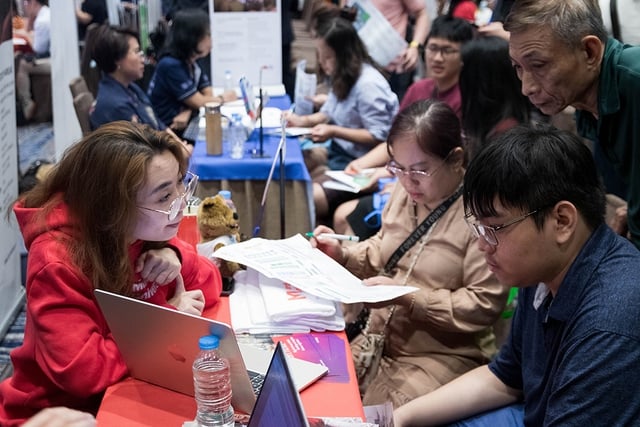
A representative of an Australian school advises students and parents at a study abroad seminar held in Ho Chi Minh City in July.
PHOTO: NGOC LONG
Understanding these difficulties, Mr. An informed that some American universities have flexibly considered allowing international students to enroll late, some even asked lawyers to intervene to reserve early interview slots for their DHS. Some schools allow temporary online enrollment and can come to the US to study directly when a student visa is issued, or allow students to transfer to the next semester if they do not have time to apply for a visa.
Mr. An added that recently he has seen many DHS being denied visas or being put under administrative processing because they have not made their social networks public or have not provided full account information in their visa application (DS-160). Therefore, the director advises DHS to fully declare all social network accounts they have used in the past 5 years, including accounts that are not used regularly, when preparing their application. At the same time, you need to ensure that the content on your personal pages is transparent, positive, and consistent with your student visa application (regarding the purpose of study, place of study, major) and you should consider making your account public.
Overall, changes in US visa policies have led to a slight decrease in DHS enrollment in all source markets, including Vietnam, although the school still maintains scholarships and tuition reduction policies as usual, according to Ms. Thalia R. Saplad, Director of International Cooperation at Edmonds College (USA). The phenomenon of declining enrollment is similar to many other schools among the more than 4,000 higher education institutions in the US.
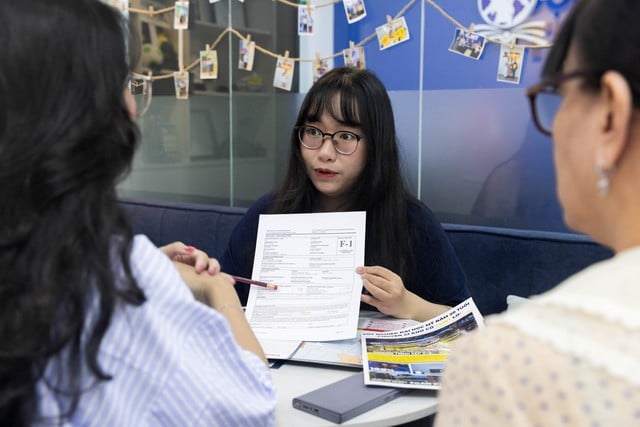
An employee of a study abroad company guides parents and students through the procedures for applying for a US student visa.
Photo: Ngoc Long
However, Ms. Saplad emphasized that this decline does not necessarily come from DHS losing interest in studying in the US, but the biggest obstacle comes from the visa issuance process. "We do not lack applications, but many students have to apply for a visa twice to get accepted or even cannot schedule an interview. Some students have to delay their enrollment or postpone to the next semester, and we can be flexible in supporting them, as long as they contact us early," the female director of information said.
Sharing more about the admission regulations for the 2026-2027 school year, Ms. Saplad affirmed that the school will not have any changes. Regarding the scholarship policy, in addition to Ms. Saplad's office, DHS can also apply for scholarships through the scholarship fund office, which has more than 1,000 scholarships of all kinds for students. "Don't give up hope," Ms. Saplad advised.
Ms. Vu Thi Thuy, in charge of enrollment for the Vietnamese market of Amerigo Education Group (USA) - an organization representing many American boarding high schools, shared that while the country temporarily stopped opening new interview schedules, she still supported interview training, checked documents for students and kept in touch with parents. When the registration schedule reopens, she will follow up with partners to schedule interviews as soon as possible.
However, for a unit that considers the key enrollment period to be in June and July, Ms. Thuy shared that this year's enrollment season "almost failed to recruit new students." Therefore, to attract applications, Amerigo in July launched a new scholarship program for late decision-makers, with a total value equivalent to 45% of the total cost (including tuition, accommodation, and other expenses).
In addition, this summer the school also opened a dormitory and host house system (living with locals - PV) to support DHS students who do not intend to return to Vietnam to avoid risks in visa issues.
For the 2026-2027 school year, Ms. Thuy said that many schools in the system such as St. Anthony High School, St. John the Baptist High School (New York) or Bishop Montgomery High School, Ambassador Christian Academy (Los Angeles) will offer scholarship programs specifically for Vietnamese DHS, worth from 15,000 - 20,000 USD (392 - 523 million VND). "Vietnam is the country with the most scholarships, while other countries have almost none or very few," Ms. Thuy added.
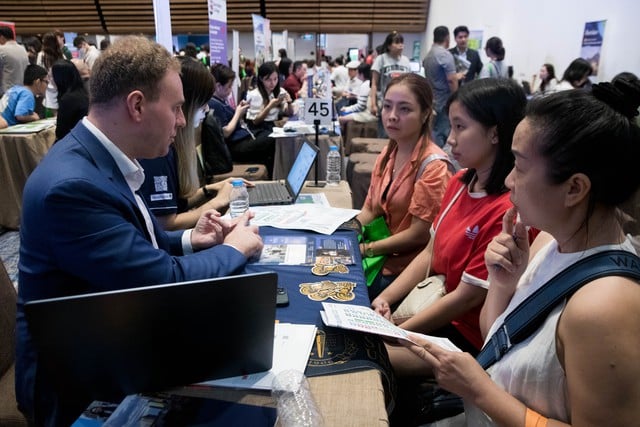
American university representatives advise parents and students at a study abroad seminar held in Ho Chi Minh City in July.
Photo: Ngoc Long
N MANY FINANCIAL SUPPORT
In addition to the US, Canada has also recently announced many policies related to international education, most recently increasing the requirement for financial proof to 22,895 CAD (434 million VND). Previously, this country also changed many policies such as increasing foreign language requirements and conditions for applying for a post-graduation work permit (PGWP), reducing the quota of new study permits by 10% compared to 2024, or increasing the number of overtime hours...
Another new point is that DHS students who want to apply for PGWP to stay and work for up to 3 years must study one of the fields of study on the list published by Immigration, Refugees and Citizenship Canada (IRCC). This requires DHS to be strategic when choosing a field, while the school must continuously update the list of eligible training programs, according to Ms. Mia Le, Marketing Director in Vietnam of Vancouver Community College (Canada).
Ms. Mia added that although the entry requirements have not changed, Vietnamese students have an advantage because Canadian schools now offer many scholarships for foreigners, which was almost non-existent before. The range of support will range from free registration to scholarships of 2,000-10,000 CAD (37-189 million VND), while tuition fees at colleges only fluctuate between 18,000-20,000 CAD (341-379 million VND).
Ms. Nguyen Tu Anh, admissions representative of Seneca Polytechnic (Canada), said that to adapt to the new trend, the school is promoting training in fields such as information technology and artificial intelligence (AI). In addition, some fields of study such as nursing and aviation, which were previously only for local students, are now open for foreign students to register.
"In addition, the school also offers entrance scholarships and English language scholarships, as well as free registration to attract students," Ms. Tu Anh informed.
Australia has also made many changes in the past, the latest being an increase in the number of new DHS recruitment quotas by 9% in 2026, to 295,000 places, and no school will be allocated a lower quota than in 2025. However, Australia is also the country with the most expensive student visa fees in the world after deciding to increase them to 2,000 AUD (33 million VND) in early July.
To reduce financial pressure on DHS, Mr. Trent McHenry, Development Director of the Australian Institute of Higher Education (AIH), said that the school is currently implementing a "block model" training model that allows students to study only one subject for 4 weeks before moving on to the next subject, and at the same time, pay tuition fees for each subject instead of having to pay "in one lump sum", and DHS still graduate on time as in the normal program, without any additional time extension.
Vietnam is one of the key investment markets.
New Zealand currently considers Vietnam as one of its key investment markets, and recently this country has issued a new policy related to the right to work of DHS. Regarding visa policy, Mr. Scott James, New Zealand Consul General in Ho Chi Minh City, informed that there will be no change in granting student visas to Vietnamese people, but on the contrary, the processing time will be increasingly shortened, sometimes only taking about a week to complete.
Source: https://thanhnien.vn/du-hoc-thoi-siet-chat-chinh-sach-truong-nuoc-ngoai-tim-cach-thu-hut-hoc-sinh-viet-185250806201734815.htm


![[Photo] Solemn opening of the 8th Congress of the Central Public Security Party Committee, term 2025-2030](https://vphoto.vietnam.vn/thumb/1200x675/vietnam/resource/IMAGE/2025/10/4/f3b00fb779f44979809441a4dac5c7df)
![[Photo] General Secretary To Lam attends the 8th Congress of the Central Public Security Party Committee](https://vphoto.vietnam.vn/thumb/1200x675/vietnam/resource/IMAGE/2025/10/4/79fadf490f674dc483794f2d955f6045)
![[Photo] Bustling Mid-Autumn Festival at the Museum of Ethnology](https://vphoto.vietnam.vn/thumb/1200x675/vietnam/resource/IMAGE/2025/10/4/da8d5927734d4ca58e3eced14bc435a3)





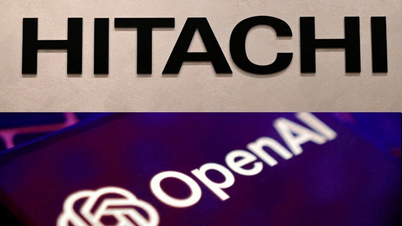
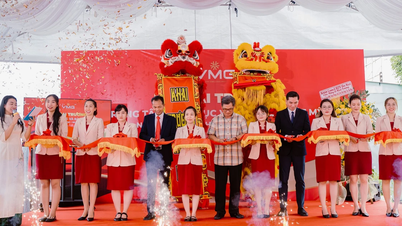


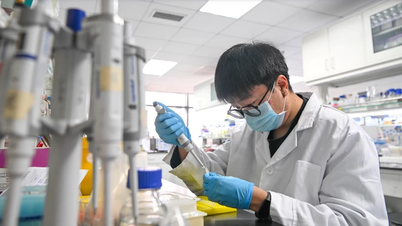


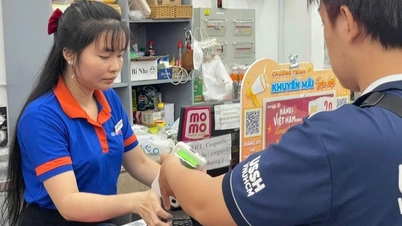

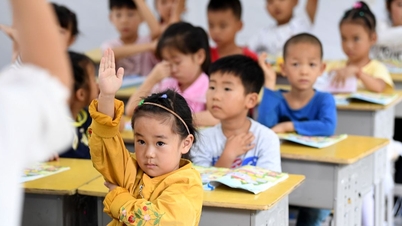

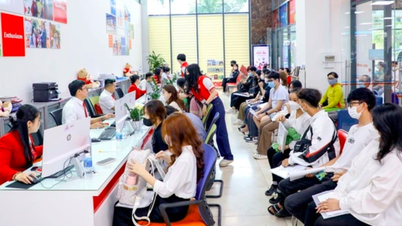
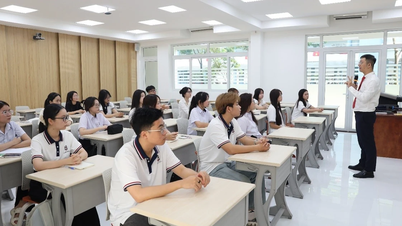

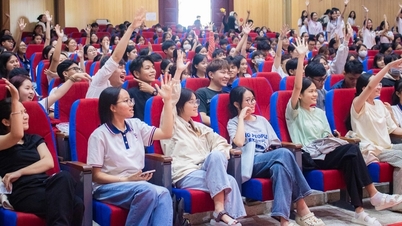







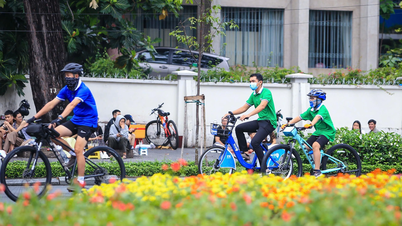

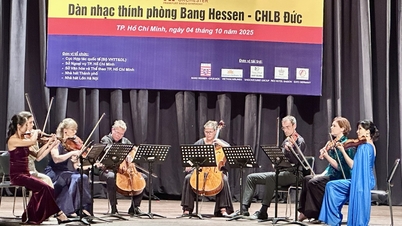
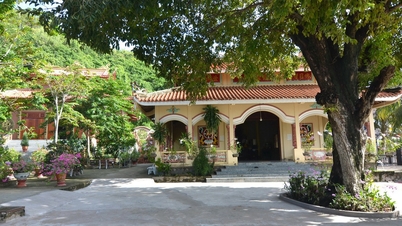
























![[VIDEO] Summary of Petrovietnam's 50th Anniversary Ceremony](https://vphoto.vietnam.vn/thumb/402x226/vietnam/resource/IMAGE/2025/10/4/abe133bdb8114793a16d4fe3e5bd0f12)

![[VIDEO] GENERAL SECRETARY TO LAM AWARDS PETROVIETNAM 8 GOLDEN WORDS: "PIONEER - EXCELLENT - SUSTAINABLE - GLOBAL"](https://vphoto.vietnam.vn/thumb/402x226/vietnam/resource/IMAGE/2025/7/23/c2fdb48863e846cfa9fb8e6ea9cf44e7)




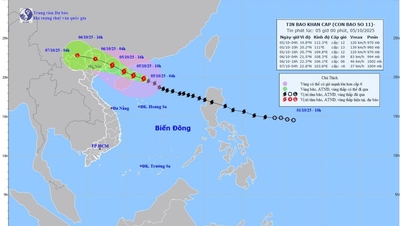

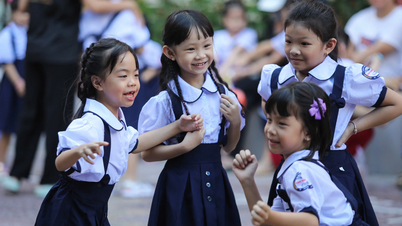









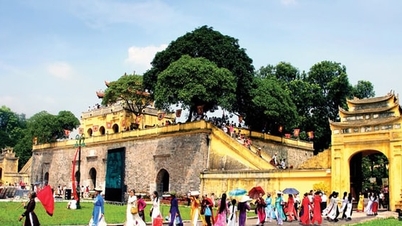

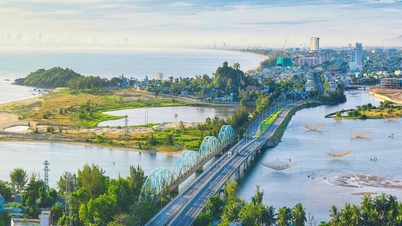



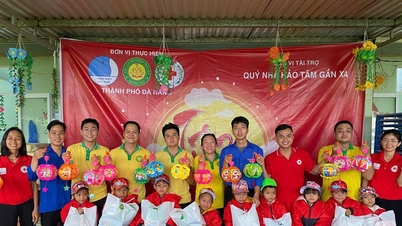

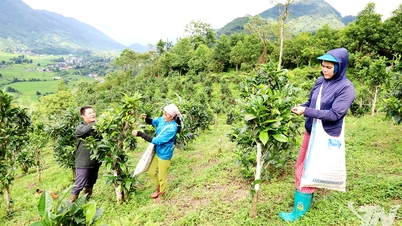










Comment (0)